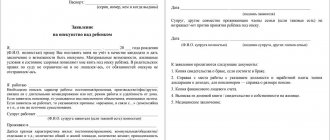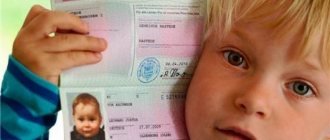Home » Guardianship and adoption » Guardianship of a disabled child
Every child, especially if he is disabled, needs parents, or at least a foster family or guardianship. But taking care of such a baby is a big responsibility. That is why the laws of the Russian Federation establish strict rules for registering guardianship over a disabled child. How to obtain custody of a child who has health problems? What responsibilities will a guardian have to perform? What payments and benefits is he entitled to in this case?
Who can become a guardian?
The basic conditions for establishing guardianship over a disabled child are outlined in several legislative acts: in Art. 35 of the Civil Code of the Russian Federation, in Art. 146 of the RF IC and Art. 10 of Law No. 48-FZ of April 24, 2008.
So, let's consider who can become the guardian of a child with a disability. Basic conditions for persons wishing to take custody of a “special” child:
- At least 18 years of age and full legal capacity . An emancipated citizen who has not reached the age of majority cannot apply for guardianship.
- Permanent official income . The minimum monthly income of a potential guardian is not established by law. A person wishing to take custody of a child must provide information about any income (salary, pension, benefits, etc.) for the last 12 months before contacting the PLO with an application for guardianship.
- Availability of permanent living space . It makes no difference whether the applicant owns the residential premises, or whether he lives there under a lease or social tenancy agreement, the main thing is that the housing must be permanent and not temporary.
- Consent of the candidate for guardianship . Consent must be in writing. The law does not provide for the establishment of guardianship against the will of the potential guardian.
- No criminal record . The law prohibits the transfer of minors into the custody of persons with convictions for serious and especially serious crimes, as well as persons with an outstanding criminal record.
- Absence of any restrictions on parental rights . Persons who have previously been deprived of parental rights in relation to other children, as well as limited parental rights, are not prohibited from placing a child under guardianship.
- Lack of official same-sex marriage . In Russia it is impossible to enter into a same-sex marriage, but there are countries where such marriages are allowed. If a same-sex marriage is concluded in any other country, citizens of the Russian Federation lose the right to obtain guardianship over a minor.
- Child's consent . In cases where a minor over ten years of age can understand the consequences of his words and actions (is not disabled due to mental illness), guardianship over him is possible only with his consent.
Can a disabled adult become a guardian for a disabled child?
There are often cases when a person with a disability wants to take custody of a disabled child. Russian legislation restricts the establishment of child guardianship only to disabled people of the first group, who themselves need constant guardianship and care.
But a number of diseases of potential guardians will not allow a minor to be handed over to them, even if the applicant does not have a disability. Such diseases include:
- tuberculosis;
- any cancer;
- alcohol, drug or any other addiction;
- infectious diseases.
However, even if the guardianship authorities refused to formalize guardianship on the basis of the above-mentioned diseases, in some cases, challenging the decision of the OPP in court can give a positive result for the potential guardian. This is possible in cases where the child, at the time of filing the application for guardianship, had already lived with the applicant for quite a long time.
In such situations, the court may accommodate the plaintiff halfway.
Example
The married couple Oleg and Natalya Efimov lived for more than three years together with little Nina Koromyslova, who was Oleg’s ward. At the time of registration of guardianship, the girl had a disability due to mental illness. Three and a half years after gaining custody of the child, Oleg died in a car accident. Guardianship of the girl was automatically terminated due to the death of the guardian.
Natalya became very attached to little Nina, and the little girl, despite her illness, felt safe next to the woman and loved her. Natalya applied to the Public Prosecution Service with a request to establish guardianship over the girl, but she was diagnosed with a second stage cancer tumor. Based on this diagnosis, the PLO staff refused to grant the woman custody of the child.
Efimova filed a lawsuit to cancel the conclusion of the guardianship and trusteeship authorities that it was impossible to establish guardianship due to her illness. At the trial, she explained that the girl was used to living in a family, and due to the fact that she has a mental illness, changing her usual environment is fraught with serious consequences for the child’s psyche. The plaintiff herself recently underwent surgery, is currently undergoing chemotherapy, and doctors give a good prognosis.
The court took into account all the circumstances of the case and satisfied the woman’s claims. The baby stayed to live with Natalya.
Should parents give a share to their disabled son who is the child’s guardian?
My daughter lived with me until she was 10 years old, according to the court. I gave her a share in the house along with other children. Then I decided to live with my father, he is a disabled person of the third group, does not work, lives in his father’s house. He, his father, his mother, our daughter, the middle brother with his wife and son, and the younger brother are registered there. House 34 m2. They quickly concocted a court order that she would live there. The grandfather wants to bequeath the house to his middle son. Should parents give their ex a share, since the child is registered with him, or will he remain on the street after the reading of the will?
Sons have equal rights of inheritance. And even if the grandfather bequeaths the house to the middle son, his wife and sons, who are registered and live there, can challenge the will. This is especially true for those who live there for a long time and have no other housing, and those who are incapacitated, for example, a disabled person. But your daughter has nothing to count on, since she is the heir of the next line and she has a mother with whom she can live.
For which disabled child can guardianship be granted?
Every child left orphan can be adopted or taken under guardianship. Moreover, even if the minor’s parents are alive, but:
- deprived of parental rights;
- limited rights of parents;
- declared incompetent by the court;
- are in prison;
- lead an antisocial lifestyle;
- are themselves minors (under sixteen years of age);
- create unbearable conditions for the child’s life;
- refuse to take a minor from a specialized children's or medical institution;
- avoid raising a child,
then the baby can be transferred to the care of third parties.
The only condition for registering guardianship over a minor child left without parental care is that he must be no older than 14 years. After he turns 14 years old, guardianship over the child is impossible; in this case, guardianship is issued.
Benefits for guardians of disabled people of group 1
- to pay for utilities and home telephone;
- treatment and recovery in sanatoriums of the region or country;
- reduction of tax rates (land, transport, property);
- travel on public transport and other benefits depending on the region.
When appointing a guardian, the state first of all considers close relatives. If there are no such people or they refuse (this often happens in practice), another person residing in the given territory of the Russian Federation is appointed.
How is guardianship of a disabled child obtained?
Raising and supporting a disabled child is much more difficult than a healthy child. The process requires a significant investment of money, moral and physical strength. Of course, Russian legislation provides for:
- free medical care;
- free provision of rehabilitation equipment;
- payment of disability pension,
but in practice, the costs of maintaining such children significantly exceed financial assistance from the state. This is why some parents cannot cope with supporting disabled children. And that is why many “special” children are left without parental care. There are several reasons:
- Parents abandon their newborn immediately after his birth, while still in the maternity hospital. This happens especially often if the baby has serious physical pathologies.
- Neither mother nor father perform parental responsibilities. There are often cases when parents take a child from the maternity hospital, but then do not rehabilitate him at all; as a result, such a child does not receive proper care and attention.
- Parents try to provide the baby with everything necessary and work a lot for this; as a result, they have neither the time nor the physical ability to care for a sick child.
- The child has reached the age of 18 and is then declared legally incompetent.
Important. Establishment of guardianship is possible only over a minor under the age of 14 or over a disabled person deprived of legal capacity by a court.
With living parents
Not every parent is able to take on the upbringing and maintenance of a seriously ill disabled child. This becomes a difficult test for every family in which “special” children are born, so cases of abandonment of disabled children immediately in the maternity hospital are not as rare as we would like. It is also not uncommon for parents to take such a baby home, but then realize that they cannot cope with the heavy burden.
There are cases when PLO employees discover that the mother and father cannot or do not want to provide the baby with proper care, in which case they initiate deprivation of parental rights or restrictions on the rights of the child’s parents.
After such a decision comes into legal force, the disabled child can be transferred to another family for upbringing. Of course, first of all, the guardianship authorities try to find relatives of the minor who will agree to take custody of the disabled child. And only after all attempts to transfer the baby into the care of his relatives have been exhausted, can he be transferred into the care of strangers.
After 18 years
Registration of guardianship over an incompetent citizen who has reached the age of 18 differs from registration of guardianship over a minor child. In cases where a child under 14 years of age has been placed under guardianship, once the minor reaches the age of fourteen years, it ends and guardianship begins.
To re-register guardianship, it is necessary to declare the disabled child incompetent, and this is only possible in court. Close relatives of the minor, as well as the guardianship and trusteeship authorities and the prosecutor's office have the right to initiate legal proceedings to declare a disabled child incompetent.
The process takes place according to the procedure of special legal proceedings, that is, the applicant and other interested parties participate in the court, but there are no defendants. In trials of this kind, it is mandatory for the court to appoint an expert examination of the ward’s sanity.
With parental consent
Maintaining a disabled child requires a lot of money, so parents are constantly looking for additional opportunities to earn money. Often the way out of this situation is to work on a rotational basis, because it is no secret that this type of income brings income to the family much higher than with regular work. However, the rotation method provides for a long absence of legal representatives, and a minor, and also a sick child cannot be left without parental care.
The state has provided a way out of this situation by giving the parents of a minor the opportunity to transfer him into temporary custody at the request of the child’s legal representatives. In this case, parents independently choose which of their relatives or friends they are willing to transfer their child to. As a rule, the baby is placed under the temporary care of a grandmother or grandfather, other close relatives, or, in extreme cases, close friends.
The requirements for a temporary guardian are similar to those that exist when a minor child is permanently placed under guardianship. Therefore, not every citizen can become a temporary guardian, even if the child’s parents completely trust him.
The guardianship department can and should refuse to issue temporary guardianship if the applicant, for example, suffers from alcohol addiction or leads an antisocial lifestyle. The OOP will not allow the child to be placed under temporary guardianship by a person working the night shift or daily.
Disability in children
Children born with birth defects and anomalies are not always recognized as disabled: there are unified standards that allow specialists to classify the condition of each individual child and classify him as a seriously ill child in need of care.
Health deterioration is also possible due to past illnesses, injuries, accidents, etc. A special institution, the medical and social examination (MSE), which includes experienced doctors of various specializations, has the right to determine the degree of damage to the child’s body and assign the status of a disabled person.
Members of the commission examine sick children, study the documentation provided, and not in their personal opinion, but guided by legislative norms, render a verdict on the assignment of disability or refuse to satisfy the application. The concept itself is comprehensively revealed in Art. 1 of the Law of November 24, 1995 No. 181-FZ “On the social protection of disabled people in the Russian Federation.”
The establishment of disability is regulated by the following regulations:
- RF PP dated February 20, 2006 No. 95 “On the procedure and conditions for recognizing a person as disabled”;
- RF PP dated March 29, 2021 No. 339.
If previously it was necessary to present a child with special needs in person to an MSA appointment, regardless of the severity of the condition, and also without taking into account the inaccessibility of the place of residence and difficulties with organizing delivery, now, thanks to RF PP No. 339, it is possible to assign a disability remotely, as well as for several at once years or until adulthood. This means that annual re-examination of a child with special needs is no longer always required.
By opening Appendix No. 1 to RF PP No. 339, everyone can see a list of diseases or conditions for which a minor will be officially recognized as disabled, in which cases an absentee examination is possible, etc.
Group difference
As stated in clause 7 of the RF PP No. 95, as well as in Art. 1 of Law No. 181-FZ, until a minor reaches the age of 18, there is only one category - a disabled child. The current legislation does not provide for different groups for children.
Difficulties in courtship
Caring for a child with special needs varies depending on:
- degree of damage to the body;
- localization of the problem;
- age and weight of the disabled person;
- the presence of special devices, mechanisms and the feasibility of their use, etc.
It is impossible to compare the difficulties of caring for a baby who is blind, deaf or deaf-blind and for a teenager with a severe form of cerebral palsy, amputation of a body part, etc. But in all cases, care and assistance for such children are necessary, as well as treatment, constant medical care. procedures.
Registration procedure
Registration of guardianship or trusteeship is carried out by the PLO. A potential guardian must contact the department of guardianship and trusteeship that is located at the place of residence of the future ward. Registration of guardianship over a disabled child occurs in two stages.
The first stage is collecting the necessary documents. At this stage, the potential guardian must:
- Prove that he has every reason and opportunity to raise a sick child.
- Confirm that the minor was left without parental care. In other words, the applicant must provide the OOP with documents indicating that the child’s parents have died, been deprived of parental rights, or are unable to fulfill parental responsibilities for some other reason.
At this stage, the candidate for guardian visits two authorities:
- Medical institution. Here he must undergo an examination and receive a conclusion that, due to health reasons, he can fulfill the responsibilities of raising a disabled child.
- Law enforcement agencies. Here the citizen must receive a document stating that he has no criminal record.
The second stage is the transfer of the application and a package of documents to the POO and verification by guardianship authorities of the information provided by the potential guardian. The inspection must be completed within two weeks.
After receiving the application, an inspection of the residential premises in which the disabled child is expected to continue to live is initiated, and an inspection report of the applicant’s living conditions is drawn up. Also, PLO employees study all the documents attached to the application, the applicant’s income, and other circumstances.
Within fifteen days after the examination, the candidacy for guardianship is considered and a decision is made on the possibility (or impossibility) of transferring the child into the custody of the applicant.
If the guardianship authorities decide to refuse to transfer the minor into custody of the applicant, they are obliged to detail the reasons for the refusal. The applicant has the right to challenge the refusal in court.
Sample application for appointment of guardianship of a disabled child
Documents ordered by the guardianship department
Not all data must be prepared by the potential candidate and the representative of the mentee. A number of information is prepared by a specialist from the guardianship department.
These include:
- To register the placement of a minor ward . Information about the candidate’s criminal record, an extract from the house register, information about the availability of a pension. Information about the amount of the pension is ordered for the child.
- When placing an incapacitated ward . Information about the candidate's criminal record, an extract from the house register, information about pension. In relation to the potential ward, information about the amount of the pension and an extract from the house register are additionally ordered.
List of documents
Depending on the age of the person over whom guardianship is planned, the list of required documents will differ.
A candidate for guardianship for a disabled minor child will have to submit the following package of documents to the Office of Public Prosecutors:
- photocopy of passport;
- certificate of income for the last 12 months;
- medical report;
- written consent to formalize guardianship from all members of the applicant’s family over 10 years of age;
- autobiography;
- title documents for residential premises (ownership certificate or social tenancy agreement);
- extract from personal account;
- certificate of completion of training in guardianship courses;
- marriage certificate (if available);
- conclusion of the PLO that the applicant can be a guardian for a disabled child.
An example of an autobiography when filing an application for guardianship
List of documents for a disabled minor
Documents for a potential ward are prepared by the child’s legal representatives. This could be the department of guardianship and trusteeship, the child’s parents, the head of the social or medical institution where the minor is located.
An approximate list of required documents:
- birth certificate of a disabled child;
- if available - passport;
- medical report;
- ITU certificate confirming disability;
- compulsory medical insurance and SNILS;
- if available, information about the management of the mother’s pregnancy and childbirth;
- information about adult and minor relatives of the potential ward;
- information about the child’s parents (personal statement or court decision on deprivation of parental rights);
- information about the minor's property.
List of documents for an incompetent disabled person over 14 years old
To obtain guardianship over an incapacitated disabled person, you must provide:
- a photocopy of the potential ward’s passport;
- medical report;
- ITU certificate;
- individual rehabilitation program;
- SNILS and compulsory medical insurance policy;
- information about the property of a disabled person;
- information about his place of residence.
Documents ordered by the guardianship department
Guardianship and trusteeship employees order a number of certificates and information on their own. There are two options for requested documents:
- To obtain guardianship over a disabled minor child . OOP specialists request: information from law enforcement agencies about the presence or absence of a criminal record of a potential guardian;
- an extract from the applicant's house register;
- information about the presence or absence of a child’s disability pension and its amount.
- information about the applicant's criminal record;
State assistance to guardians of disabled people of group 1
Citizens who wish to obtain guardianship over a person with disabilities - a group 1 disabled person - must meet certain requirements. When deciding who will provide the necessary assistance to a disabled person, close relatives are considered priority.
- Passport of guardian and disabled person. Copies will also be required.
- A certificate indicating the income of the person exercising guardianship.
- Application form from the place of work, characteristics.
- Conclusions of doctors monitoring the rehabilitation of a disabled person.
- A doctor's report confirming the normal condition of the guardian.
- Document of legal capacity.
- A document confirming that a citizen has no criminal record.
- A short autobiography written by a guardian.
- A document containing the results of an inspection of the guardian’s place of residence.
- The consent of the family members of the guardian that their relative will care for a disabled person of group 1 is drawn up by hand, in writing.
Benefits and payments
According to Decree of the President of the Russian Federation No. 551 of March 17, 1994, in cases where the guardian does not have an official job, he has the right to receive guardianship payments in the amount of 60% of the minimum wage. In addition, the entire time that a disabled child is under guardianship, the substitute parent has work experience for calculating a pension.
The ward, in turn, retains his right to receive an apartment from the state after he comes of age, as well as to receive a share of the living space of his biological parents, even if they are deprived of parental rights. In addition, a disabled child has the right to admission to a higher or secondary specialized educational institution on preferential terms and to free education in these educational institutions.
The amount of payments to the guardian of a disabled child depends on the age of the ward:
- Cash benefit for child support plus disability pension.
- Cash compensation for caregivers plus additional disability benefits.
- Cash payments based on Decree of the President of the Russian Federation No. 175 of 2013 plus the regional coefficient. In 2021, these payments amount to ten thousand rubles.
Applicants who are ready to accept a disabled child into their family are subject to special requirements, and this, of course, is justified, since raising a “special” child and caring for him requires additional effort, both moral and physical. That is why, if you decide to take such a serious step, you must understand that from now on your life will be under the close attention of PLO employees.
Even before you apply for custody of your child, it is advisable to get advice from an experienced lawyer so that you do not subsequently face a refusal to obtain custody due to the fact that you collected the wrong documents or did not start the procedure in the right order. registration
You can get the necessary advice by contacting our website staff.
FREE CONSULTATIONS are available for you! If you want to solve exactly your problem, then
:
- describe your situation to a lawyer in an online chat;
- write a question in the form below;
- call Moscow and Moscow region
- call St. Petersburg and region
Save or share the link on social networks
(
1 ratings, average: 5.00 out of 5)
Author of the article
Natalya Fomicheva
Website expert lawyer. 10 years of experience. Inheritance matters. Family disputes. Housing and land law.
Ask a question Author's rating
Articles written
513
- FREE for a lawyer!
Write your question, our lawyer will prepare an answer for FREE and call you back in 5 minutes.
By submitting data you agree to the Consent to PD processing, PD Processing Policy and User Agreement
Useful information on the topic
4
Removal of a child from the family by guardianship authorities
Russian legislation carefully regulates the activities of guardianship and trusteeship authorities. Any…
7
How to write an autobiography for guardianship (sample)
An autobiography is a biography of a person written by himself. Often this...
4
Who is guardianship established over?
All responsibility for socially vulnerable citizens is assigned to district departments...
1
Valuation of an apartment for guardianship authorities
If you are selling your own apartment, then evaluate it, and...
Permission to sell an apartment from the guardianship authorities
Property rights of citizens under guardianship (regardless of their age)…
Characteristics of a guardian from the place of work
A guardian who takes in a child left without parental care bears...
Are guardians entitled to pensions: how much are the payments and what are the conditions for receiving them?
Accordingly, they inevitably incur costs. To compensate them, they can receive payments from the use of this property. And the amount of payments cannot be more than 5% of the amount of funds received from the use of the property.
- The guardian must raise the disabled child. The fact of disability must be verified before guardianship is established. Accordingly, the guardian is aware of the disability and still voluntarily agrees to care for the child. This is important, because a disabled child will live in a family, provided with the necessary care and concern. Therefore, the benefit seems fair and even necessary;
- The guardian is obliged to continuously care for the child until the age of 8 years. This is a minimum period, but guardianship will not end even after it is reached. It will remain, and the spouses will continue to take care of the disabled child in the future. At the same time, their status should not be interrupted and guardianship should not be terminated. Continuity is an important condition under which early retirement is possible for caregivers. Thus, if guardianship is established after the child reaches 8 years of age, then the right to early retirement is not acquired. That is, the maximum period during which the benefit can be calculated is the specified eight years;
- early guardianship pension is reduced by one year every year and a half of maintaining this status. So, after three years, the guardians’ pension will be assigned two years ahead of schedule. Since the deadline for calculating early retirement is eight years, it will be possible to reduce the length of service by no more than 5 years;
What types of guardianship are there and what is their difference?
Depending on the age category of a particular citizen with health problems, the government determines the appropriate guardianship.
Patronage
This type of assistance is provided for persons who need protection of their rights or interests. Basically, people with disabilities ask employees of the Pension Fund of the Russian Federation for such a service when they need help related to their health condition.
Guardianship
This form of guardianship is characterized by assistance to minors from 14 to 18 years of age, whose actions are limited by a court decision.
Once caregivers have completed all the necessary documentation, they become responsible for the disabled person and must provide sufficient support and assistance. Their responsibilities include monitoring the implementation of all requirements and obligations imposed by the court.
Full custody
Guardianship is issued for children who have not reached 14 years of age and are declared incompetent by a court decision. In this case, guardians are the legal representatives of minors and must perform various legal actions on their behalf.










